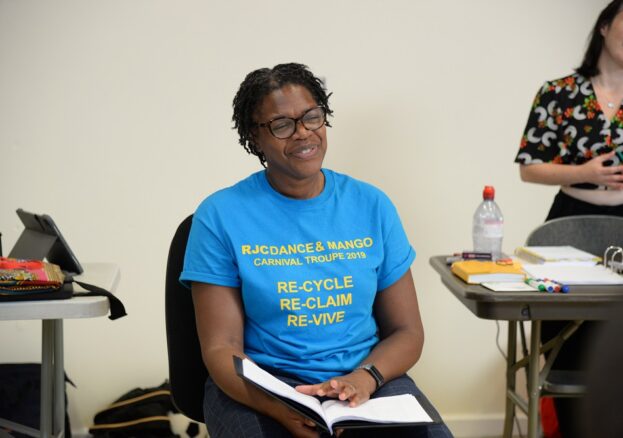
Natasha Gordon’s hit play Nine Night is enjoying its regional premiere at Leeds Playhouse this month. This reimagining is directed by Amanda Huxtable, a Leeds-based director, producer, and co-director of Vanitas Arts. Leanna Benjamin, Leeds Playhouse Artist for Change and Writer in Residence, sat down with her to talk about her creative process and how her own heritage gives her a unique insight into this emotive comedy-drama.
Amanda Huxtable is dressed in a blue RJC Dance t-shirt when she arrives for our interview in the restaurant at Leeds Playhouse. As always, she’s literally wearing her passion for her community on her sleeve – paying homage to the inspirational and empowering Chapeltown-based Black dance organisation of which she is chair.
A prime motivation for Amanda taking on Nine Night is her dedication to supporting writers who have faced barriers in the past: “This play is part of a flurry of work from emerging Black British writers, who have always written in this country but have not always had the opportunity to see their work on the main stage, or any stage at all.
“Natasha Gordon’s play was written in 2018 in the foyer of the National Theatre. She chose to write the stories she could not see. It’s not based on her family, but it is inspired by a family. In this comedy, you feel the pain, you feel the love and you feel the need to literally belly laugh.”
Nine Night is the story of a family struggling to navigate the death of their matriarch, Gloria. Her children and grandchildren attempt to carry out the traditional Jamaican Nine Night wake, but old family feuds surface and tensions build. Against the backdrop of the Nine Night celebrations, where the rum is flowing, precious memories are shared, and jokes are being made, the family are forced to heal old wounds. But has too much time passed?
Amanda explains what the practice of Nine Night actually is: “Essentially, it’s a celebration of life. It starts from the moment the person has passed and works through every night in order up to the burial. Because of economics, life, reality, people can have one night to represent the Nine Night, or maybe not entertain it at all. It’s usually set up at home. We call it ‘Dead Yard’ – a Caribbean saying. As soon as the person’s passed, you go to their home, you console the family, and you expect a big old dinner.”
And there’s always a drink or two: “No doubt, rum is mentioned quite a few times in the play. People enjoy partaking or not, and that’s fine because that’s exactly what Nine Night is about. You’ve got people who are there in a Christian setting with the Bible and doing the whole tambourine thing. And there are other people who are there to play dominoes, drink, and have a good time. I love the fact that all these people are under one roof, loving one person.”
Amanda lights up when she talks about the Nine Night tradition, which is obviously very dear to her heart. Was her passion for the practice why she was drawn to directing the play?
“It’s very close to my own heritage, but you’re telling a story, it’s not your story. I was drawn to it at this time because I was thinking about the way we tell stories now. We’ve just gone through a pandemic and we’ve lost a lot of people – and are still losing them. I think our country could do with a big old Nine Night.”
Nine Night was originally performed at the National Theatre, then transferred to Trafalgar Studios in the West End. So, how does Amanda’s approach differ from the original?
“At the end of the day, the text is there, it’s like Shakespeare, right? I didn’t see the original Nine Night, and that’s helpful for this production. My approach is, it’s like a pot. You can have the same ingredients, but when you add your own flavour, you’ve got a different ‘ting’. Our blend of the northern and southern regions is our ‘ting’.”
Amanda becomes really animated when she talks about creating a space for different voices to shine: “We’ve got a community cast as well as a professional cast. Although the story is set in Hackney, it was important for us to have a Yorkshire voice on the set. Hackney is a famous Black community, but so is Chapeltown, so is Harehills. I believe it’s important to tell this story in a national way.”
Amanda is an inspirational force in the theatre and wider arts community, so what advice would she give to an aspiring director? “You’ve got to love stories. If you don’t love stories, then get out of the game. Reading scripts is important but raw talent isn’t enough, you need to have a grasp of the technical side. Understanding rhythm and structure helps. If you don’t have an opportunity to train due to finance, utilise the free resources available online, as well as the many schemes that support early career creatives.”
Nine Night runs at Leeds Playhouse from 26 September to 15 October. So, what’s next for Amanda?
“Oh, that’s interesting. So many things. It’s what’s happening already. At Vanitas, we’ve just produced a jazz audio drama series called Persons of Interest. We’ve recorded it and we’re in the process of editing it right now so it’ll go out in the autumn. You know, I write, and I direct, and I produce. As a freelancer, you’re constantly building on your body of work.”
